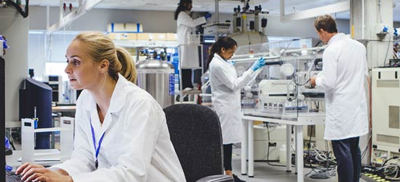Artificial Intelligence (AI) is transforming the healthcare industry and bringing forth revolutionary changes. AI can be simply defined as the ability of a machine or program to think and learn. This technology presents the opportunity to conduct sophisticated human tasks more efficiently at an increased speed and lower cost. Early adopters of AI technology are already seeing the benefits to patients, physicians, and the broad healthcare community. Continue reading to learn more about recent growth areas.
Disease Diagnosis and Precision Medicine
The introduction of AI into daily practice can decrease the number of medical errors and wrong diagnoses due to human errors. With the use of imaging and diagnosing techniques, AI applications have the potential to eliminate the need for manual human review and decrease the number of diagnosis mistakes. Researchers have developed AI software that can more accurately predict diseases like breast cancer risk. Developed by researchers at Houston Methodist Research Institute, this program is 30 times faster than a human doctor at reliably reading mammograms and converting patient data into diagnostic information. It also operates at a 99 percent accuracy level. According to the National Cancer Institute, over half of U.S. women who get an annual mammogram for 10 years in a row will have a false-positive result during that time. False positives can lead to unnecessary additional tests, such as biopsies. This is stressful for not only the patient but also adds costs and wastes time for health services globally.
Artificial Intelligence is radically advancing the industry for both patients and healthcare professionals. AI is utilizing medical knowledge to generate patient-specific assessments and provide recommendations to clinicians and researchers. This technology is making service better by offering quicker and more reliable support. A notable success case is the IBM trial program to identify people at risk for developing heart disease. Using creative learning prowess and the natural language found in physician notes, the program was able to identify 8,500 patients that were at risk of developing congestive heart failure within one year. By focusing on prevention, patient outcomes are vastly improved.
Precision health is the future of patient care. Healthcare organizations are capitalizing on the rapid evolution of AI to transform the delivery of services such as targeted treatments, individualized medications, and personalized therapies. Most programs and clinical trials are still in their infancy, including the National Institute of Health’s All of Us Research Program. The NIH aims to gather data from over one million people in the United States to accelerate research and improve overall health. Additionally, Deep Genomics is utilizing advancements in AI, biology, and automation to enable a new approach to drug development. Their revolutions in molecular biology AI have unlocked the ability to experimentally verify compounds virtually to manipulate cell biology along crucial pathways. Researchers hope to continue to uncover new paths toward better precision medicine.
Patient Integration and Consumer Technologies
Artificial Intelligence is improving workloads globally for healthcare professionals. Health chatbots are gaining traction in the industry across all aspects of the patient journey. These AI-powered systems are connecting patients to providers on cost-effective mediums like mobile devices and computers. The chatbots have a variety of functions including answering medical questions, assessing symptoms, developing a diagnosis, and guiding patients through their personalized care plans. Developed with AI software and a content library of clinically-intelligent conversations, some systems even incorporate human avatars and are capable of interacting with human characteristics like empathy. While the amount of traditional in-person visits are being reduced, engagement is actually increasing. Automated chatbots can check in with patients routinely and continually supply providers with updated information. AI systems are boosting patient contact and activating workflows that support streamlined care processes.
While AI is enhancing the daily work of doctors, nurses, and other healthcare professionals, it is also upgrading the quality of health and care of the general public. In addition to receiving better overall care, patients now have the ability to maintain a healthier lifestyle by tracking their own activity levels through popular fitness trackers from companies like Fitbit, Garmin, and Apple. AI analytics are being incorporated into other wearables as well. By attaching sensors to inhalers, Propeller Health has developed a solution to predict potential asthma attacks. Data from respiratory medication intake and environmental conditions are analyzed by AI software to predict changes in asthma conditions in this groundbreaking project. Healthcare companies are continuing to find new ways to leverage AI technology in the form of thoughtfully designed and high-quality consumer technologies.
Stevenson University Online’s Master’s in Healthcare Management
The time has never been better for students to pursue a master’s in Healthcare Management from Stevenson University Online. The Bureau of Labor Statistics (BLS) indicates that healthcare management is one of the fastest-growing occupations in the country, due to the expansion and diversification of the healthcare industry (Bureau of Labor Statistics, 2014). The BLS also projects that employment of medical and health services managers is expected to grow 23 percent from 2012 to 2022, which is faster than the national average for all other occupations.
Stevenson University Online’s master’s in Healthcare Management program is taught by practicing healthcare managers and combines theory with applied skills and expertise to expand their skill-sets. Students and graduates have advanced their careers within the industry at hospitals, long-term care facilities, physician practices, insurance companies, medical technology and device companies, and nonprofit healthcare-related organizations. Our graduates have a 100% employment rate, a statistic that speaks to the value of a Stevenson education.
Stevenson University Online has earned certification for our program design by the Quality Matters Program (QM). The Online Program Design Certification recognizes programs that are designed around measurable learning objectives and competencies. Stevenson University Online is proud to instill a culture of quality in our course and program offerings.
Contact us at 1-877-531-7118 or suo-inquiry@stevenson.edu to learn more about Stevenson’s Healthcare Management program.






